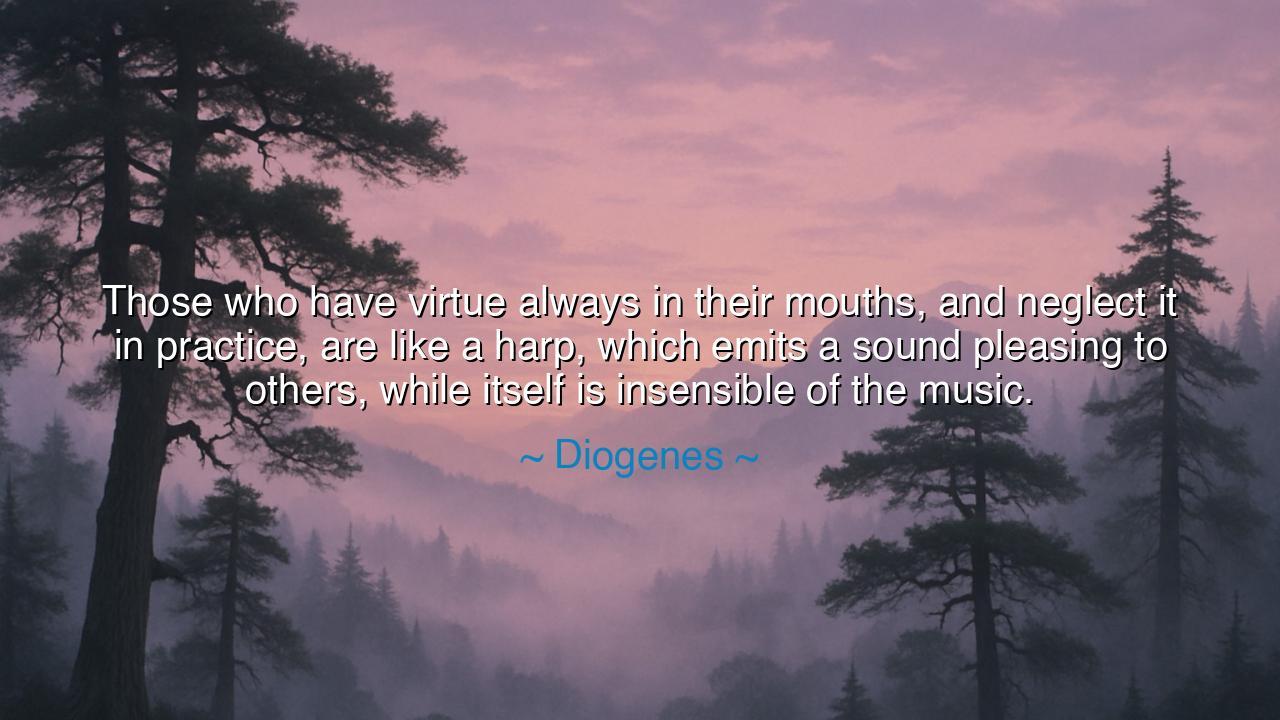
Those who have virtue always in their mouths, and neglect it in
Those who have virtue always in their mouths, and neglect it in practice, are like a harp, which emits a sound pleasing to others, while itself is insensible of the music.






Hear the biting words of Diogenes, the Cynic, who with fearless tongue revealed the hypocrisies of men: “Those who have virtue always in their mouths, and neglect it in practice, are like a harp, which emits a sound pleasing to others, while itself is insensible of the music.” In this teaching is contained a mirror, one that forces us to gaze upon our own duplicity. To speak of virtue yet live without it is to betray both the word and the soul, to offer beauty to others while remaining empty within.
The image of the harp is no accident. The harp produces sweet tones that delight those who hear, yet the instrument itself has no sense of its own harmony. So it is with the hypocrite who speaks of courage, honesty, or compassion but does not embody them. His words may inspire, his teachings may move others, but he himself remains barren of the very spirit he proclaims. This is the danger Diogenes warns against: to become an instrument of sound without becoming a vessel of truth.
In the life of ancient Rome we find a telling example. Seneca, the Stoic philosopher, often wrote of wisdom, moderation, and detachment from wealth. Yet in practice, he amassed great fortunes, served as tutor to Nero—the tyrant whose cruelty burned Rome—and benefited from the very excesses he condemned. His writings inspired many, and still inspire to this day, but critics of his time saw him as the harp of Diogenes’ warning: producing pleasing sound, but himself insensible to the music. His life was a reminder that to preach virtue without living it brings dishonor, even if the words endure.
Yet there are also those who embody the opposite, whose deeds shine brighter than their proclamations. Consider Mahatma Gandhi. He did not only speak of simplicity and nonviolence; he lived them. His clothes were humble, his food was plain, his protests were peaceful, and his life was consistent with his teaching. His words moved millions because his actions gave them weight. He was not a harp unconscious of its music; he was a living song, one who felt every note and taught not just by his voice but by his being.
The lesson of Diogenes is a call to integrity. Words are powerful, yes, but without action, they are hollow. To speak of justice without practicing fairness, to praise love while harboring cruelty, to extol honesty while weaving deceit—these are the marks of the hypocrite. Such a life may impress the crowd for a moment, but it leaves the soul untouched, unsatisfied, and unworthy of the very truths it proclaims.
Therefore, beloved listener, let this wisdom shape your path: be the music you speak of. If you speak of kindness, practice kindness until it flows from you like breath. If you counsel patience, endure trials without complaint. If you praise virtue, let it be seen in your steps, not only in your speech. Remember that people may forget your words, but they will never forget the life you lived before them.
Practical action is clear: test your speech against your behavior. Each day, ask yourself—“Do I live the truths I tell others?” If not, humble yourself, and begin again. Let your voice and your deeds become one instrument, in tune with each other, so that the harmony is not only heard by others but felt within your own soul. For only then will you avoid the fate of the harp that delights others yet remains deaf to its own beauty.
And so, the teaching of Diogenes endures: let your life and your words sing the same song. For in that harmony lies true virtue, the kind that not only pleases the ears of others but awakens the deepest music within your own heart.






AAdministratorAdministrator
Welcome, honored guests. Please leave a comment, we will respond soon